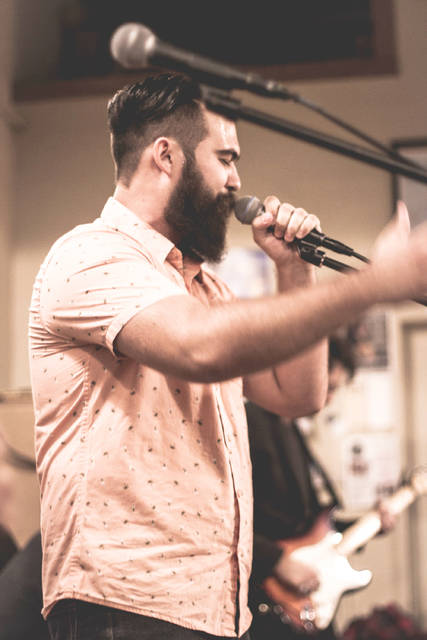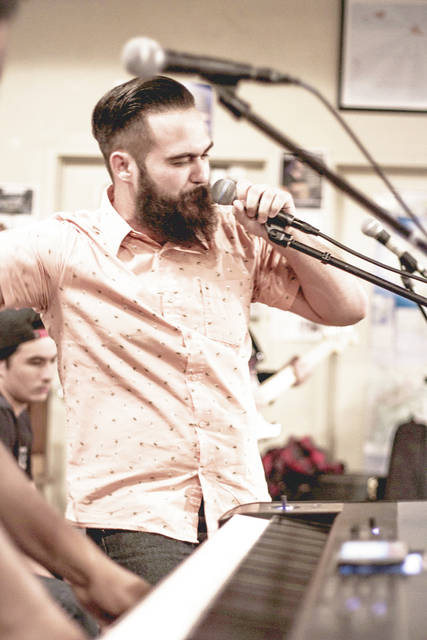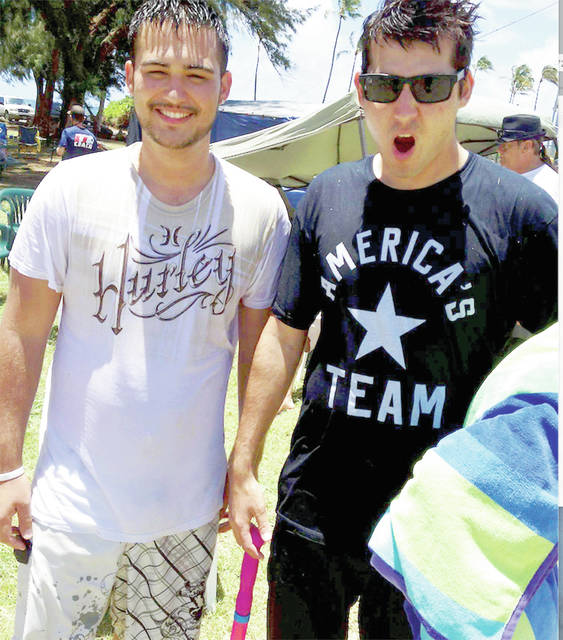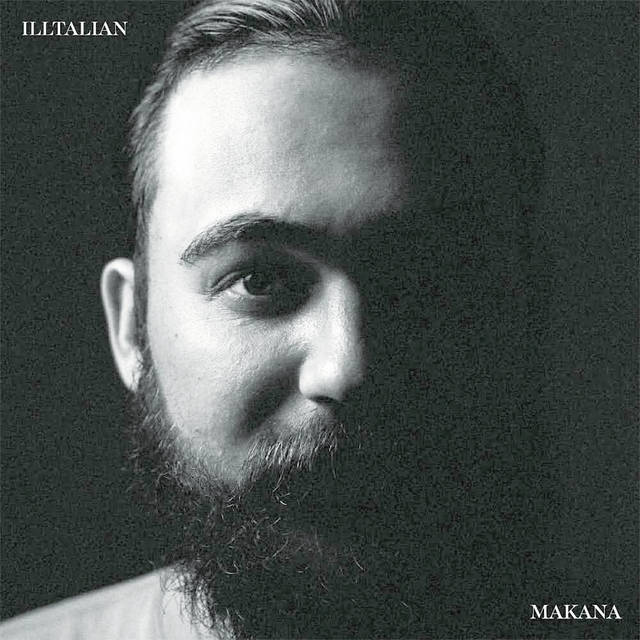Talk Story with Thomas Iannucci

Photo by Alyssa Carvalho
Thomas Iannucci takes the stage.

Photo by Alyssa Carvalho
Thomas Iannucci rocks out live.

Photo courtesy Thomas Iannucci
Thomas Iannucci and friend Lucas Makana Riley, in their younger days.

Photo by Jerek Barcelona
The album cover for Thomas Iannucci’s new full-length album, “Makana,” was designed by Jake Gonsalves.
Thomas Iannucci started the year off right, he says with a smile, by releasing his first full-length album, “Makana.”
Thomas Iannucci started the year off right, he says with a smile, by releasing his first full-length album, “Makana.”
The 25-year-old Christian rapper from Eleele calls it some of his best music, and he beams with pride as he talks about the songs, the talented people who worked with him, and his high hopes for its success.
It’s available, he said, “anywhere you can get music online.
“You can listen to it on your Xbox now while you’re playing video games,” said the 2010 Waimea High graduate
“Makana” includes nine songs, about 38 minutes of music.
“It’s relatively short,” Iannucci said. “I’m a very strong believer less is more. I’d rather leave people wanting more than having them saying, ‘Turn this guy off already.’”
The original material includes contributions from his sister, Dondi Iannucci.
“She is on the song ‘Pride’ toward the beginning of the album and the title track, ‘Makana,’ which is at the end.”
“Makana” is a tribute to Iannucci’s good friend, Lucas Makana Riley, who died in a car crash in 2016 when his car was struck by a drunken driver in San Diego.
Riley, a 2010 Kauai High School graduate and graduate of Point Loma Nazarene University, was 24.
“The whole thing is in memory of him,” Iannucci said.
Can you tell us about Lucas Makana Riley and your friendship?
We had a very special connection with music. When I first started rapping, I was, like, 15. He was one of the first people who really took a vested interest in my music and kind of believed in me. ‘Hey, you have something here, we should try to take that to the next level.’
When I was in college and I was trying to put together my first CD, his father, Mark Riley, a very talented musician, he has a professional studio in his basement. Of course, at that time, you’d kill for something like that, to have a place to record, for free. It’s a very high quality of music and I was formerly recording on a little USB microphone in my dad’s office room.
How did Lucas influence you?
Lucas was like, ‘Let’s take this to another level.’ He was a talented musician and my very first producer. He would make beats for me, we wrote a little bit together.
He and I actually, along with Dondi and another friend named Aowl Owen, who plays the violin on the song, we came up with the song together. So it was really important I had that song on this album. He gave me so much great feedback, he was very exacting. He wasn’t going to settle for less. But it was a compliment to me that he believed I was capable of more.
He was very encouraging. Sometimes, he was like, ‘OK dude, for real, you can do better than that. Go collect yourself and come back and let’s do this for real.’ We worked on it a lot.
I was in the process of making what would become this album, not knowing , or having a vision for it, when the accident happened and he passed.
What did you do?
I took a break from music. I had so many memories of him in music. But when I came back, I had a clearer idea of what I wanted to do for him. And that’s where the album name came from. There’s only one song that directly addresses him, but he’s there in the background, in the back of my mind and the music.
Can you describe your music?
A lot of it’s very personal, but not all. My first attempt at a CD, which was ‘Sleepless Nights,’ was very therapeutic but very dark. it was like, I want to get all this off my chest. Everyone was like, ‘Yeah, it was great, but now I just want to cry.’ That’s not always what you want to hear.
I did try to lighten it up a little bit. There’s some fun, upbeat music on there, too, which is new for me. But there’s a lot of personal things on there. Like the song ‘Fadeway.’ That was a finalist in the John Lennon songwriting competition … talking about my struggle with anxiety.
The song ‘Pride’ I did with Lucas talks about the way that pride can be such an ugly thing and it can really take you to an ugly place and it’s only through Jesus you can over come that sort of thing.
The song ‘Makana’ is about grief and losing him.
What other songs are on the album?
I have a song at the very end, it’s almost like a spoken word, called ‘Make America Hate Again.’ It’s an attempt to call us all together over this political divide
There are some more upbeat songs, like ‘Supposed to Be,’ and it features Je’kob Washington, a very successful billboard-topping artist of Christian hip hop
Je’kob, I got to know him a little bit, a very cool guy. I’ve been a fan of his music for years. He was part of the group Souljahz, they had some success in the early 2000s, they had a lot of success with their debut album.
My dad, with his good taste in music, found them and got me to follow them.
And so, he’s been someone I wanted to work with for a long time.
How did you connect with him?
In early 2016, I was finally in a position where I had something I could take to him and I reached out to him. I showed him ‘Fadeway’ and a couple other songs and we were able to make that connection. But one of the cool things we found out, he’s actually from Hawaii. He’s from Big Island, half- time there and half-time in California.
There was something that clicked right way and we were able to make that work. What was cool is when I sent him a very, very basic beat for what would eventually become that song, he was like, ‘You know, I’m interested in working with you, I don’t really like this beat. Can I do something with this and make this pop more?’
And of course when you make something, you don’t really want to hear your art is like, so. But it was this guy. What are you going to do? Have at it. And God works in mysterious ways.
What else surprised you?
That’s how we got Spec, a Grammy nominated producer, involved in the project. Unbeknownst to me, he went and reached out to Spec, Spec owned him a favor. All of the sudden you’ve got Je’Kob Washington and a producer whose one of the biggest names in Christian rap on your project. It’s like, wooo. That was amazing.
So, this album is what you wanted it to be?
This is pretty much my life’s work for the last year and a half. Me and my executive producer spent hours and hours of writing and recording and revising, tweaking, sending it out to people getting feedback, going back and changing it. He and I would be there all day. Just to have it done is amazing. And God opened some doors.
To see it all coming to fruition, it’s very humbling. Feedback so far has been very positive. ‘Fadeaway’ is resonating with people the most, I think.
What’s next?
I’m already writing new songs. I have some collaborations with some bigger artists like kj52, who’s sold hundreds of thousands of records and been a personal hero of my mine forever, for the next project. My plan is this, to promote this album as much as possible. I’ll probably focus more on singles instead of an album. I feel with the way society is going right now, short attention spans, I feel like one single at a time is more digestible. We’ll see.
How hard was it to finish the album without Lucas Makana Riley?
It was hard. So many times I wish I could just send it to him. ‘Dude, what do you think of this?’ Like I did for so many years. I should text Lucas. Sometimes, it was like getting slapped all over again.
What would he think of it?
I really hope he would like it. I think he would he would probably tease me a lot about it. He was always a troublemaker. Even for his high standards, I think he would like it. I just want to do my friend a little justice.
Any final thoughts?
I’m just so grateful to Jesus, even through the hard times, being blessed enough to have a venue, an avenue, to express myself. Some really hard stuff and create something beautiful out of it. Which is always what he does. Take the hardest times and make life beautiful out of it. I’m blessed even to have this ability to do that.
What advice would you offer to other young musicians?
Anyone can do this if they want to, in this day and age. With technology, you can. There’s nothing stopping you from chasing your dream. We might not all make it at a super famous level, but you can work to support your art until your art can support you.
There’s just something about being able to create something with your own two hands. That’s a very special feeling and I’m very grateful for that.


Not into the Ghetto Beat!